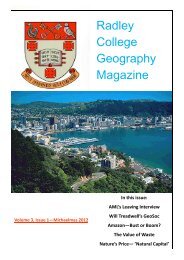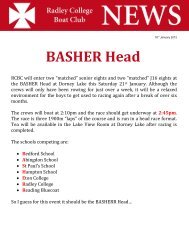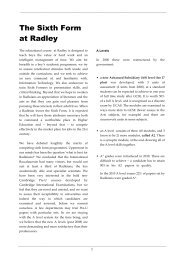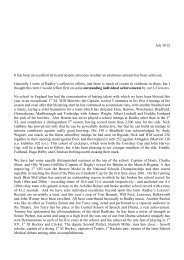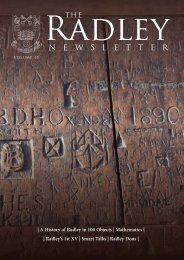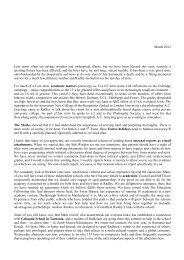INDEPENDENT SCHOOLS INSPECTORATE - Radley College
INDEPENDENT SCHOOLS INSPECTORATE - Radley College
INDEPENDENT SCHOOLS INSPECTORATE - Radley College
You also want an ePaper? Increase the reach of your titles
YUMPU automatically turns print PDFs into web optimized ePapers that Google loves.
<strong>Radley</strong> <strong>College</strong> 6<br />
performing Bach, Beethoven and Chopin from memory in an aesthetically sensitive, yet<br />
technically assured style. A recent production of West Side Story was performed with<br />
resounding success to national acclaim. It is obvious that the emphasis on teamwork is<br />
adding to the boys’ personal development.<br />
2.20 The pupils’ attitude to work is positive. They come to lessons expecting to work hard and<br />
enjoy their learning. Evidence of co-operative learning was widespread, both in academic<br />
areas and in teams. Many pupils commented on the willingness of other pupils to be<br />
supportive in the learning process: “there is always someone around who will give you help”.<br />
Pupils persevere with tasks, both in the classroom and in their homework, and organise their<br />
work effectively. Files are very well kept and pupils are keenly aware of academic sources<br />
on the intranet. As they mature, in a number of areas boys acquire the skills to research and<br />
study independently. The college acknowledges in its own evaluation the aim to do even<br />
more on independent learning, and staff are encouraged in the college teaching policy to<br />
facilitate independent learning. In the best practice observed this was the case; however, it is<br />
not universal.<br />
2.21 The boys enjoy and thrive on the variety of learning methods offered to them, whether<br />
working in pairs, for example in modern foreign language lessons, discussing and reasoning<br />
in groups, or through challenges set by their teachers.<br />
Spiritual, Moral, Social and Cultural Development of Pupils<br />
2.22 The spiritual, moral, social and cultural development of pupils is outstanding. Relationships<br />
are excellent, and a sense of community is evident throughout the college. Such<br />
accomplishments resonate with the college’s stated aim of developing a community which<br />
values decency, tolerance and gentility.<br />
2.23 The pupils have an outstanding spiritual awareness, centred on the role played by the chapel<br />
in the daily life of the college. Congregational singing and prayer deepen pupils’<br />
consciousness of the spiritual dimensions of life, which are complemented by prayers in<br />
socials and the Christian forum. A bible reading begins the day in most lessons and is<br />
reprised in the evening chapel service, framing the day within a spiritual context. In lessons,<br />
too, pupils actively engage with spiritual concerns, such as the animated discussion of the<br />
nature of evil and man’s freewill in a Year 12 religious studies (RS) lesson, or the more<br />
humanistic theme of torture and totalitarianism in a Year 13 theatre studies lesson.<br />
Reflection on such issues plays a valuable part in pupils’ growing sense of identity and the<br />
development of personal insight. Boys study other faiths and beliefs in RS and gain<br />
awareness of spiritual diversity and difference, founded on tolerance and respect. Pupils’<br />
spirituality is also challenged by the vibrancy of the art displays throughout the college;<br />
particular challenge is given by the art displays in the heart of the science and mathematics<br />
departments.<br />
2.24 Pupils develop a strong awareness of moral issues and demonstrate a growing understanding<br />
of the difference between right and wrong and respect for the law. Pupils wrestle with the<br />
issues surrounding genetic engineering in the science curriculum, and in English, history and<br />
the college’s Amnesty group pupils develop an understanding of civil rights. Pupils consider<br />
moral positions with maturity and sensitivity, such as their thoughtful response in a Year 9<br />
history lesson to a documentary film depicting the fanaticism generated at the Nuremberg<br />
rallies. The PSHE curriculum also does much to deepen pupils’ understanding of moral<br />
issues, and pupils in Year 9 benefit from external speakers on topics such as smoking and<br />
drug addiction. In Years 10 and 11 in PSHE, pupils have the opportunity to reflect upon<br />
themes such as bullying, alcohol abuse and responsibility in society, while in the sixth form a<br />
series of lectures encourages further contemplation of moral concerns, leading pupils of all




